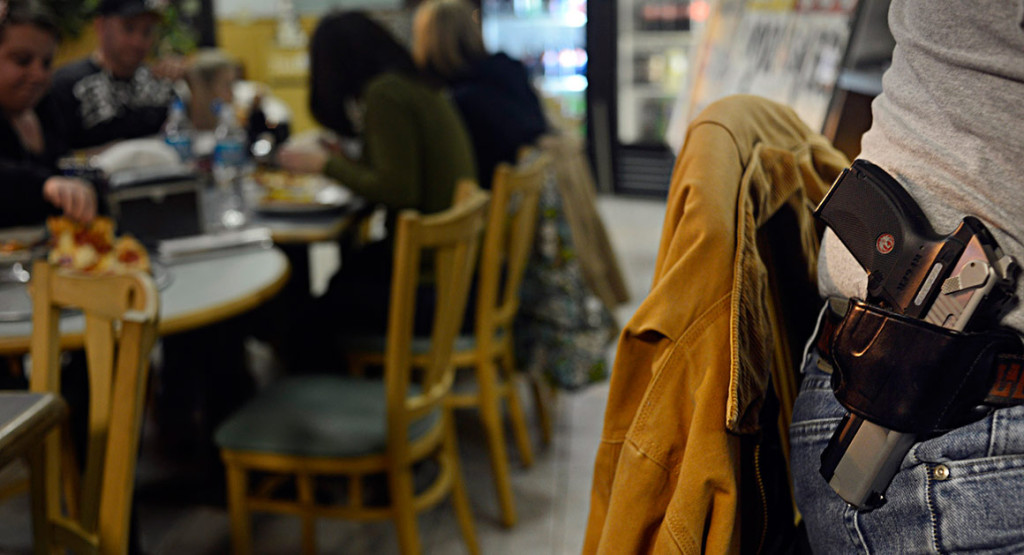
On a recent Sunday morning at a small target range in rural Frederick, Md., a handful of teenagers are shooting .22 caliber rifles. Inside an adjacent clubhouse, Perrin Lewis, a crane operator and part-time firearms instructor, presents a fact-packed, six-hour lecture about guns, gun safety and gun laws to a dozen men and one woman, each of whom paid $100 for a course that—assuming they pass a federal background check—will entitle them to receive a license to carry a concealed weapon.
The license, though, will be of no use to them in their home state of Maryland. To carry a gun there, they would have to take a far more rigorous test and then demonstrate that they have some reason for needing a gun (such as providing a “reasonable precaution against apprehended danger”). Instead, in a twist that speaks to the inscrutability of modern American gun regulation, their permits will be issued by the state of Utah, 2,000 miles due west.
Lewis, the sole proprietor of Genesis Firearms, is a genial but fervent firearms aficionado who claims to own 800 guns stored in 23 safes at his home in Waldorf, Md. He explained to me that the Utah permit has become the gold standard of concealed-carry permits because it’s cheap ($46 for residents, $51 for non-residents) and easy to acquire (you don’t have to go to Utah), but above all because it’s recognized by a total of 35 states. That’s why Marylanders apply for it, expecting it will allow them to travel widely with their guns.
Lewis, who says a private citizen “should be carrying a gun for the sole purpose of protecting themselves and their loved one,” always keeps a gun with him. Since 2009, he says, he has taught his “Utah Concealed Firearm Permit Course,” which I signed up for after seeing it advertised on the Internet, to more than 6,000 people. Similar classes have sprung up all over the country, from Maine to California, and today more than 60 percent of Utah’s half million active permits are held by people who don’t live in the state, says Jason Chapman, firearms supervisor at the Utah Bureau of Criminal Identification.
Even more striking is that while Utah might have become the diploma mill of concealed guns, it is far from an outlier. Throughout the United States, the once rare privilege of legally carrying a gun in public places has gone from almost impossible to surprisingly easy. (Virginia, for example, allows citizens to receive a permit over the Internet.) In a largely unnoted milestone, the right to carry became legal this year in the last of the 50 states when concealed weapons permits were finally legalized in Illinois, the last remaining state banning them. In 1981, 19 states banned concealed weapons, and of the states that allowed them, nearly all had onerous hurdles that gun owners had to clear in order to qualify for a permit. Today, only the District of Columbia and several U.S. territories prohibit weapons in public spaces and many of the once-challenging barriers to getting them elsewhere have come down. As of 2011, according to the Government Accountability Office, roughly 8 million Americans had gotten permits for concealed guns.
The new laws—and the number of people making use of them—are a testament to the success of a highly focused, well-financed effort over the last two decades by the National Rifle Association to push concealed-carry in every state legislature. Now, the NRA is working to build on that success by pushing Congress to enact a national “reciprocity” law which it claims will fix the problematic patchwork of state statutes that it maneuvered to enact. States such as California, Maryland, New Jersey and New York that rarely issue concealed carry permits and prohibit carrying by out-of-state residents would suddenly be required to allow any of the country’s millions of non-resident permits-holders—like, say, those licensed by the state of Utah—to carry their weapons. This federal “fix” of the NRA’s would otherwise leave intact the problematic, crazy quilt of state laws.